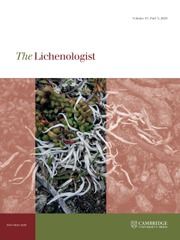Crossref Citations
This article has been cited by the following publications. This list is generated based on data provided by
Crossref.
Esslinger, Theodore L.
2006.
Recent literature on lichens—200*.
The Bryologist,
Vol. 109,
Issue. 1,
p.
112.
ALINE, TRIBOLLET
ATKINSON, M. J.
and
CHRISTOPHER, LANGDON
2006.
Effects of elevated pCO2 on epilithic and endolithic metabolism of reef carbonates.
Global Change Biology,
Vol. 12,
Issue. 11,
p.
2200.
Wierzchos, Jacek
Ascaso, Carmen
and
McKay, Christopher P.
2006.
Endolithic Cyanobacteria in Halite Rocks from the Hyperarid Core of the Atacama Desert.
Astrobiology,
Vol. 6,
Issue. 3,
p.
415.
Onofri, Silvano
Zucconi, Laura
Selbmann, Laura
Hoog, Sybren de
Ríos, Dra Asunción de los
Ruisi, Serena
and
Grube, Martin
2007.
Algae and Cyanobacteria in Extreme Environments.
Vol. 11,
Issue. ,
p.
735.
Gadd, Geoffrey M.
2007.
Geomycology: biogeochemical transformations of rocks, minerals, metals and radionuclides by fungi, bioweathering and bioremediation.
Mycological Research,
Vol. 111,
Issue. 1,
p.
3.
Sancho, Leopoldo G.
de la Torre, Rosa
Horneck, Gerda
Ascaso, Carmen
de los Rios, Asunción
Pintado, Ana
Wierzchos, J.
and
Schuster, M.
2007.
Lichens Survive in Space: Results from the 2005 LICHENS Experiment.
Astrobiology,
Vol. 7,
Issue. 3,
p.
443.
Schroeter, Burkhard
Sancho, Leopoldo
and
Allan Green, T
2007.
Functional Plant Ecology, Second Edition.
Vol. 20073278,
Issue. ,
Tribollet, Aline
2008.
Current Developments in Bioerosion.
p.
67.
Aline, Tribollet
2008.
Dissolution of Dead Corals by Euendolithic Microorganisms Across the Northern Great Barrier Reef (Australia).
Microbial Ecology,
Vol. 55,
Issue. 4,
p.
569.
Onofri, S.
Barreca, D.
Selbmann, L.
Isola, D.
Rabbow, E.
Horneck, G.
de Vera, J.P.P.
Hatton, J.
and
Zucconi, L.
2008.
Resistance of Antarctic black fungi and cryptoendolithic communities to simulated space and Martian conditions.
Studies in Mycology,
Vol. 61,
Issue. ,
p.
99.
Galloway, David J.
2008.
Austral lichenology: 1690–2008.
New Zealand Journal of Botany,
Vol. 46,
Issue. 4,
p.
433.
Cardinale, Massimiliano
Vieira de Castro, João
Müller, Henry
Berg, Gabriele
and
Grube, Martin
2008.
In situ analysis of the bacterial community associated with the reindeer lichen Cladonia arbuscula reveals predominance of Alphaproteobacteria.
FEMS Microbiology Ecology,
Vol. 66,
Issue. 1,
p.
63.
Grube, Martin
and
Berg, Gabriele
2009.
Microbial consortia of bacteria and fungi with focus on the lichen symbiosis.
Fungal Biology Reviews,
Vol. 23,
Issue. 3,
p.
72.
de los Ríos, Asunción
Cámara, Beatriz
García del Cura, Ma Ángeles
Rico, Víctor J.
Galván, Virginia
and
Ascaso, Carmen
2009.
Deteriorating effects of lichen and microbial colonization of carbonate building rocks in the Romanesque churches of Segovia (Spain).
Science of The Total Environment,
Vol. 407,
Issue. 3,
p.
1123.
Pérez‐Ortega, Sergio
Ríos, Asunción de los
Crespo, Ana
and
Sancho, Leopoldo G.
2010.
Symbiotic lifestyle and phylogenetic relationships of the bionts ofMastodia tessellata(Ascomycota,incertae sedis).
American Journal of Botany,
Vol. 97,
Issue. 5,
p.
738.
De Los Ríos, Asunción
Ascaso, Carmen
Wierzchos, Jacek
and
Sancho, Leopoldo G.
2010.
Symbioses and Stress.
Vol. 17,
Issue. ,
p.
577.
de la Torre, Rosa
Sancho, Leopoldo G.
Horneck, Gerda
Ríos, Asunción de los
Wierzchos, Jacek
Olsson-Francis, Karen
Cockell, Charles S.
Rettberg, Petra
Berger, Thomas
de Vera, Jean-Pierre P.
Ott, Sieglinde
Frías, Jesus Martinez
Melendi, Pablo Gonzalez
Lucas, Maria Mercedes
Reina, Manuel
Pintado, Ana
and
Demets, René
2010.
Survival of lichens and bacteria exposed to outer space conditions – Results of the Lithopanspermia experiments.
Icarus,
Vol. 208,
Issue. 2,
p.
735.
Raggio, J.
Pintado, A.
Ascaso, C.
De La Torre, R.
De Los Ríos, A.
Wierzchos, J.
Horneck, G.
and
Sancho, L.G.
2011.
Whole Lichen Thalli Survive Exposure to Space Conditions: Results of Lithopanspermia Experiment withAspicilia fruticulosa.
Astrobiology,
Vol. 11,
Issue. 4,
p.
281.
Garty, Jacob
and
Garty-Spitz, Rachel Lena
2011.
Neutralization and neoformation: Analogous processes in the atmosphere and in lichen thalli—A review.
Environmental and Experimental Botany,
Vol. 70,
Issue. 2-3,
p.
67.
Sánchez, F.J.
Mateo-Martí, E.
Raggio, J.
Meeßen, J.
Martínez-Frías, J.
Sancho, L.Ga.
Ott, S.
and
de la Torre, R.
2012.
The resistance of the lichen Circinaria gyrosa (nom. provis.) towards simulated Mars conditions—a model test for the survival capacity of an eukaryotic extremophile.
Planetary and Space Science,
Vol. 72,
Issue. 1,
p.
102.




